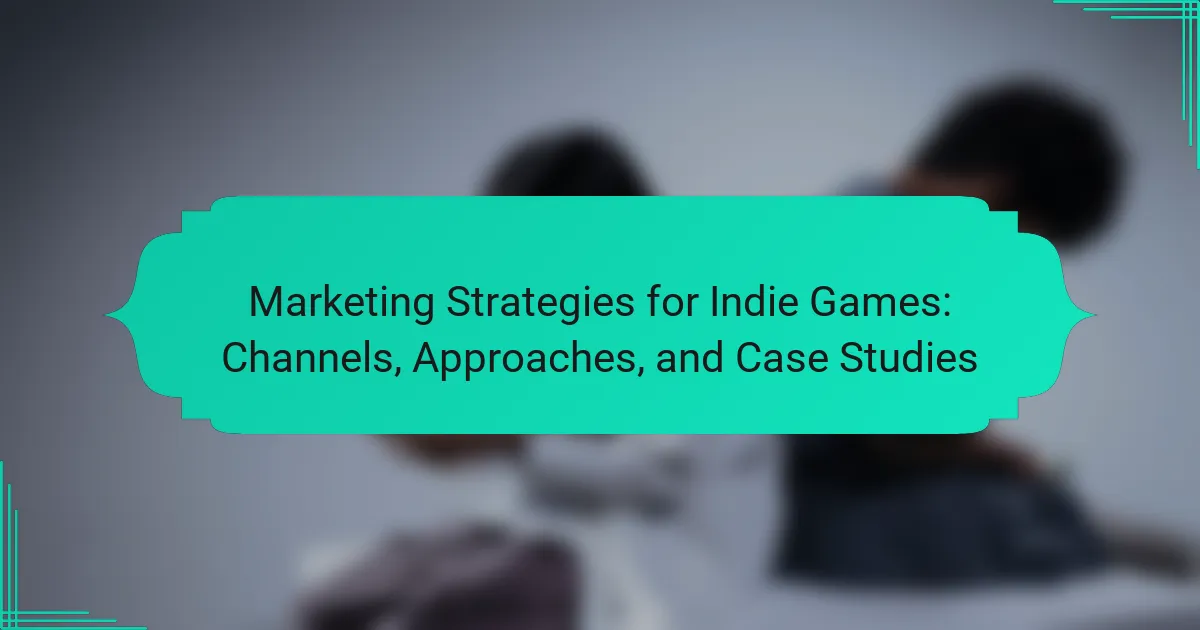Indie game developers often struggle with visibility and engagement in a crowded market. This article explores effective marketing strategies, including key channels like social media and influencer partnerships, innovative approaches for community building, and insights from relevant case studies. Understanding cultural influences and leveraging unique game attributes are also crucial for success. By employing a multi-channel approach, developers can enhance their outreach and connect meaningfully with players.
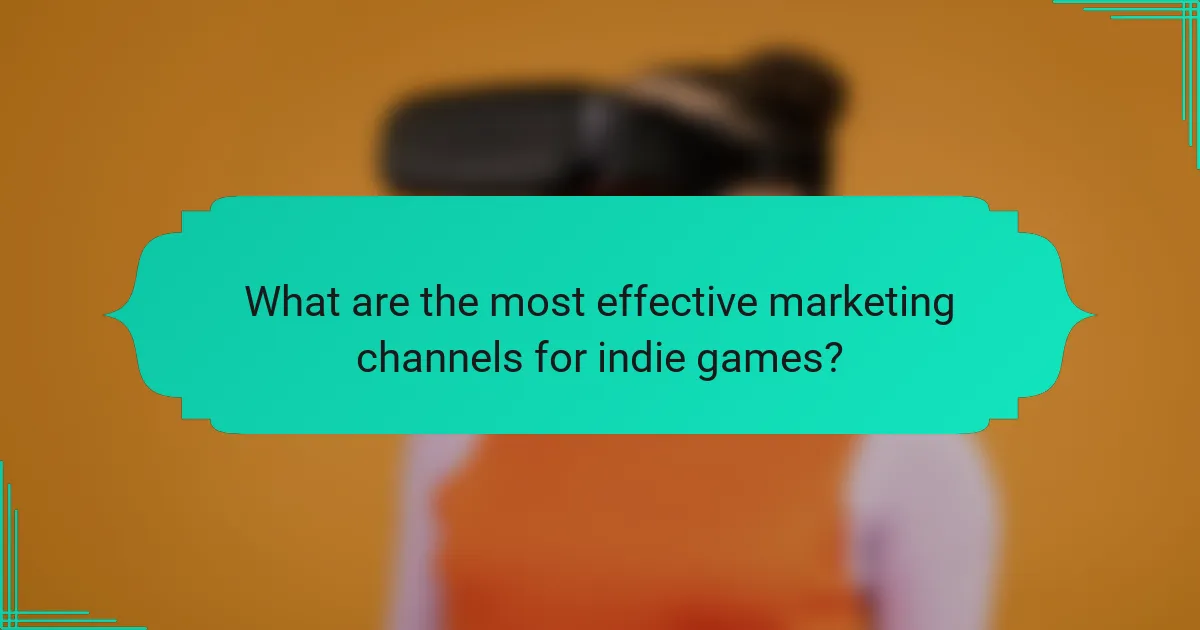
What are the most effective marketing channels for indie games?
The most effective marketing channels for indie games include social media, influencer partnerships, and gaming forums. These platforms allow indie developers to reach targeted audiences, build communities, and generate buzz.
Social media platforms like Twitter and Instagram enable direct engagement with potential players. Influencer partnerships leverage established audiences for broader visibility. Gaming forums and communities provide spaces for feedback and organic promotion.
Email marketing is also valuable, allowing developers to cultivate a dedicated follower base. Crowdfunding platforms not only raise funds but also create early interest in the game.
Each channel offers unique advantages, making a multi-channel approach the most effective strategy for indie game marketing.
How do social media platforms influence indie game visibility?
Social media platforms significantly enhance indie game visibility by providing cost-effective marketing channels. They enable direct engagement with potential players, fostering community and word-of-mouth promotion. Platforms like Twitter and Discord allow developers to share updates, gather feedback, and create buzz around their games. Case studies show that targeted campaigns on these platforms can lead to increased downloads and player retention.
Which online communities are essential for indie game promotion?
Essential online communities for indie game promotion include platforms like Reddit, Discord, and Twitter. These spaces allow developers to share insights, gather feedback, and connect with gamers. Reddit hosts various subreddits dedicated to indie games, facilitating discussions and promotions. Discord servers provide real-time interaction and community building, while Twitter enables sharing updates and engaging with a broader audience. Leveraging these communities can significantly enhance visibility and support for indie projects.
What role does influencer marketing play in indie game success?
Influencer marketing significantly enhances indie game success by increasing visibility and engagement. Influencers can reach niche audiences effectively, creating authentic connections that boost player interest. Collaborations with influencers often lead to higher download rates and community building. For instance, indie games like “Hollow Knight” gained traction through influencer streams, showcasing the game’s appeal.
How can email marketing be optimized for indie game audiences?
Email marketing for indie game audiences can be optimized by targeting personalized content and engaging storytelling. Focus on building a community around the game, using exclusive content and updates to create anticipation. Segment the audience based on interests or behaviors to tailor messages effectively. Utilize compelling visuals and call-to-action buttons to enhance engagement. Test different subject lines and sending times to determine what resonates best with the audience.
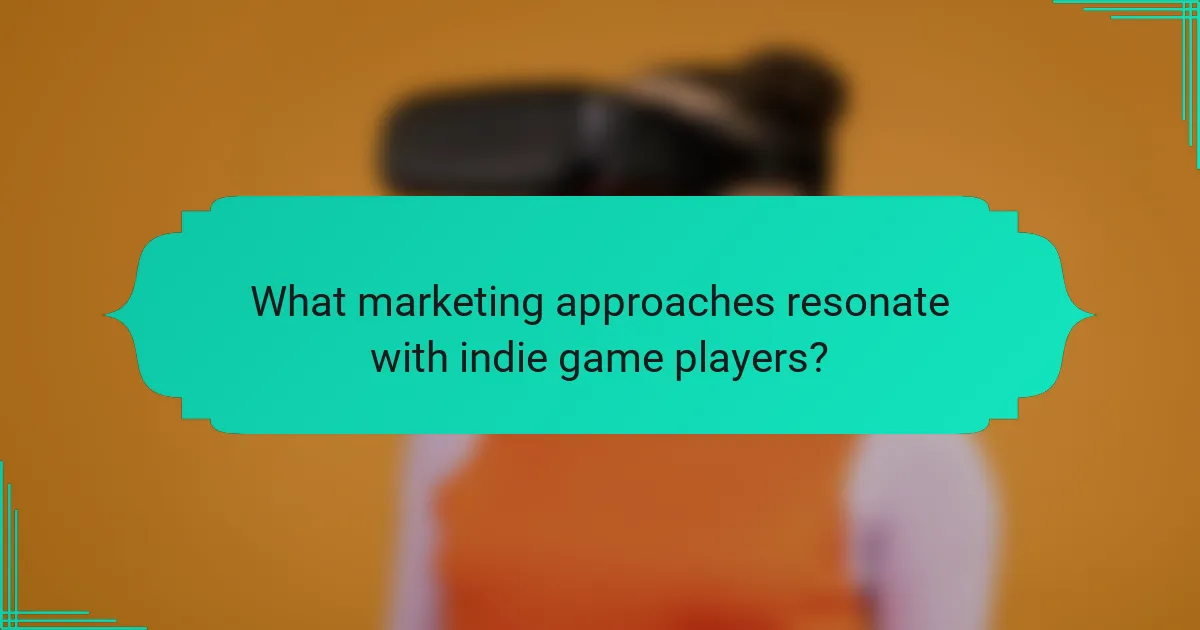
What marketing approaches resonate with indie game players?
Indie game players respond well to authentic engagement, community-building, and targeted content. Effective marketing approaches include social media campaigns, influencer partnerships, and participation in gaming events. These strategies foster a sense of belonging and trust, which resonates deeply with the indie gaming community. Engaging storytelling and unique game features also play a crucial role in attracting players.
How does storytelling enhance indie game marketing strategies?
Storytelling enhances indie game marketing by creating emotional connections with players. Engaging narratives can differentiate games in a crowded market, making them memorable. A compelling story can also foster community engagement and encourage word-of-mouth promotion. For instance, games like “Celeste” and “Undertale” utilized strong narratives to build loyal fanbases, demonstrating storytelling’s impact on marketing effectiveness.
What are the benefits of community engagement for indie games?
Community engagement significantly enhances the success of indie games by building a loyal player base and increasing visibility. It fosters direct communication, allowing developers to receive valuable feedback and improve their games. Engaging with communities through social media and forums creates a sense of belonging, encouraging word-of-mouth marketing. Collaborations with influencers can further amplify reach. Additionally, community-driven events, like game jams, can spark creativity and innovation within the indie game scene.
Which promotional tactics drive pre-launch excitement for indie games?
Effective promotional tactics for indie games include social media marketing, influencer partnerships, community engagement, and teaser content. These strategies generate buzz and attract potential players before launch.
Social media marketing leverages platforms like Twitter and Instagram to share updates and visuals. Influencer partnerships can amplify reach through established gamers who resonate with target audiences. Community engagement fosters loyalty and excitement, often through forums or Discord channels. Teaser content, such as trailers or gameplay snippets, builds anticipation by showcasing unique game features.
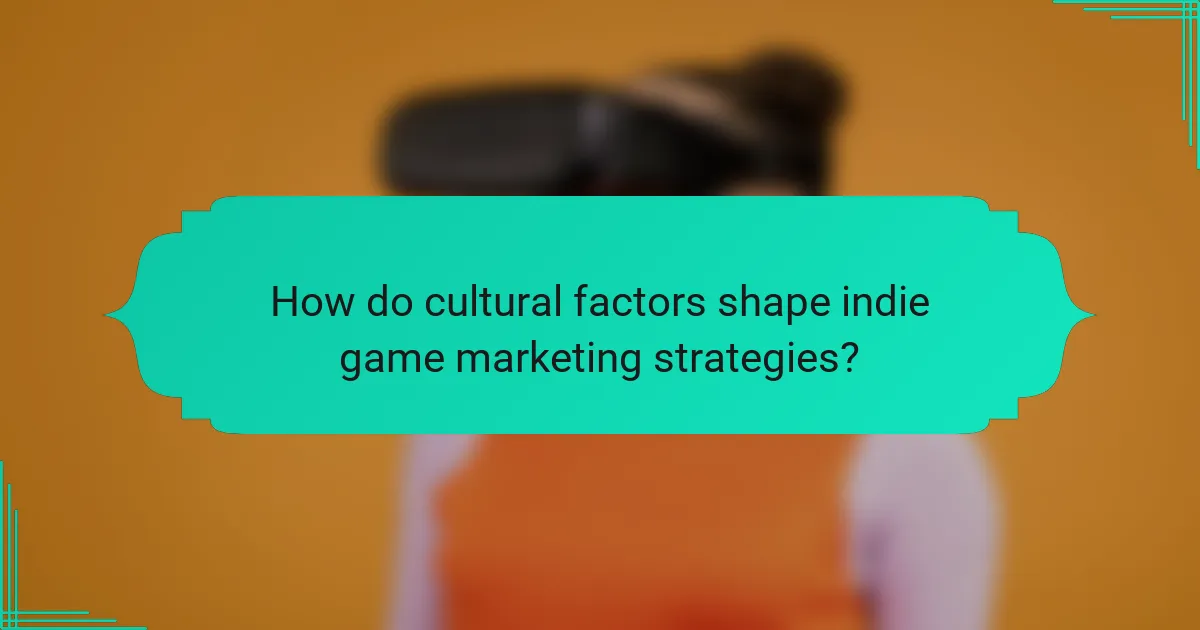
How do cultural factors shape indie game marketing strategies?
Cultural factors significantly influence indie game marketing strategies by shaping audience engagement and content relevance. Understanding local customs, preferences, and values helps tailor messaging and distribution channels effectively. For instance, using culturally resonant themes can enhance relatability and foster community support. Additionally, regional gaming trends dictate platform choices, impacting marketing approaches. Case studies demonstrate that indie games often succeed by aligning their narratives with cultural contexts, enhancing player connection and driving word-of-mouth promotion.
What regional preferences influence indie game marketing in North America?
Regional preferences significantly shape indie game marketing in North America. Key strategies include localized content, cultural references, and community engagement.
1. **Localized Content**: Tailoring game narratives and marketing materials to resonate with specific regional cultures enhances relatability. For example, using regional dialects or references can attract local players.
2. **Cultural References**: Incorporating local lore, history, or humor can create a stronger connection with audiences. Games that reflect regional identities often see higher engagement.
3. **Community Engagement**: Building relationships with local gaming communities through events and social media fosters loyalty. Indie developers often leverage platforms like Discord to connect with their audience directly.
4. **Platform Preferences**: Different regions may favor specific gaming platforms, influencing marketing channels. For instance, PC gaming has a strong following in certain areas, while consoles may dominate elsewhere.
Understanding these preferences allows indie developers to optimize their marketing strategies effectively.
How do local gaming events impact indie game visibility?
Local gaming events significantly enhance indie game visibility by providing direct interaction with audiences. These events create opportunities for developers to showcase their games, gather feedback, and build community connections. Participation can lead to increased word-of-mouth marketing and social media engagement. Additionally, local events often attract media attention, further amplifying exposure for indie titles. Engaging in these events can differentiate indie games from mainstream offerings, leveraging unique attributes that resonate with niche audiences.
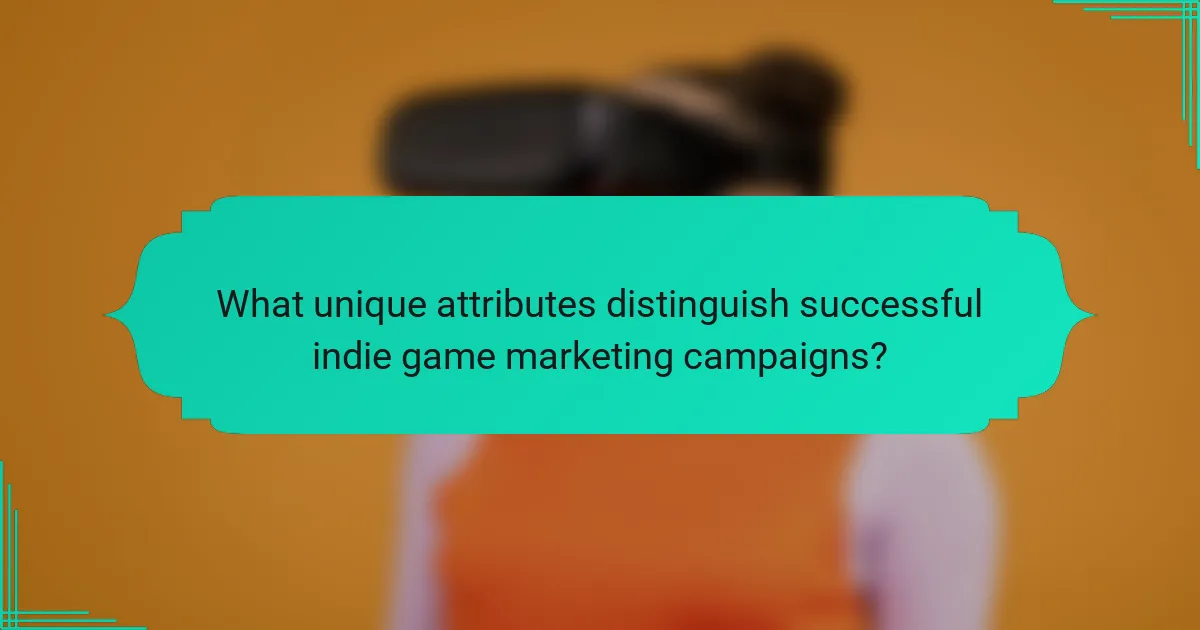
What unique attributes distinguish successful indie game marketing campaigns?
Successful indie game marketing campaigns often leverage unique attributes that set them apart. These attributes include community engagement, storytelling, targeted social media strategies, and innovative use of influencers.
Community engagement fosters a loyal player base, enhancing word-of-mouth marketing. Storytelling creates emotional connections, making the game memorable. Targeted social media strategies ensure the right audience is reached effectively. Innovative use of influencers can amplify visibility, tapping into established fan bases.
These distinctive attributes contribute significantly to the overall success of indie game marketing efforts.
How can unique game mechanics be leveraged in marketing efforts?
Unique game mechanics can enhance marketing efforts by creating engaging narratives and attracting niche audiences. They differentiate a game in a crowded market, fostering word-of-mouth and social media buzz. For instance, mechanics like time manipulation or unique crafting systems can be highlighted in promotional content. Additionally, showcasing these features in gameplay trailers or demos can effectively capture potential players’ interest. Leveraging unique mechanics not only enhances player experience but also strengthens brand identity, leading to increased visibility and sales.
What innovative marketing techniques have emerged in the indie game sector?
Innovative marketing techniques in the indie game sector include leveraging social media, influencer partnerships, and community engagement. Indie developers often create unique narratives around their games, focusing on storytelling to build emotional connections. Crowdfunding platforms are also utilized to gauge interest and secure funding, while game festivals provide opportunities for direct player interaction. Data-driven marketing strategies, like targeted ads based on player behavior, are increasingly common.
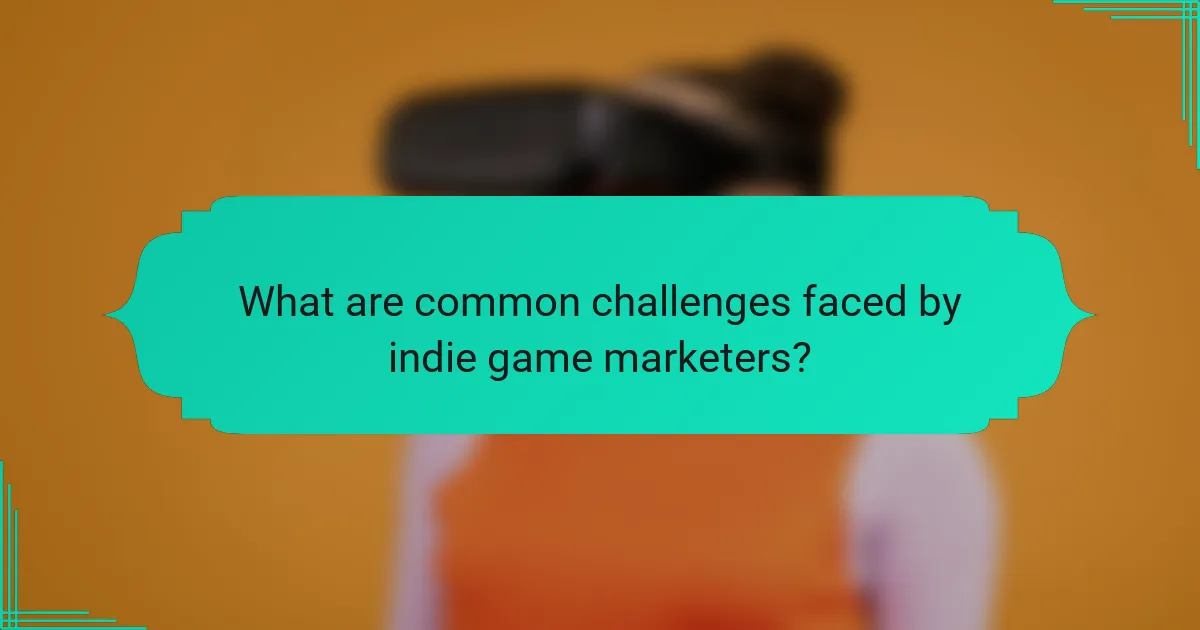
What are common challenges faced by indie game marketers?
Indie game marketers commonly face challenges such as limited budgets, oversaturation of the market, difficulty in reaching target audiences, and lack of resources for effective promotion. These issues hinder visibility and can impede sales growth. Additionally, building a community and maintaining engagement proves challenging without strategic approaches.
How can budget constraints affect marketing strategies for indie games?
Budget constraints significantly limit marketing strategies for indie games by reducing available resources. This often leads to a reliance on low-cost channels like social media and community engagement. Indie developers may prioritize organic growth through word-of-mouth and user-generated content. As a result, they often focus on niche markets, leveraging unique attributes of their games to stand out. Collaborations with influencers or participation in gaming events can also be effective, despite limited budgets.
What pitfalls should indie game developers avoid in their marketing efforts?
Indie game developers should avoid common marketing pitfalls such as neglecting audience research, over-relying on social media, and failing to build a community. Understanding the target audience is essential for effective messaging. Overlooking platforms like forums or niche websites can limit reach. Building a community fosters engagement and loyalty, which are crucial for long-term success.
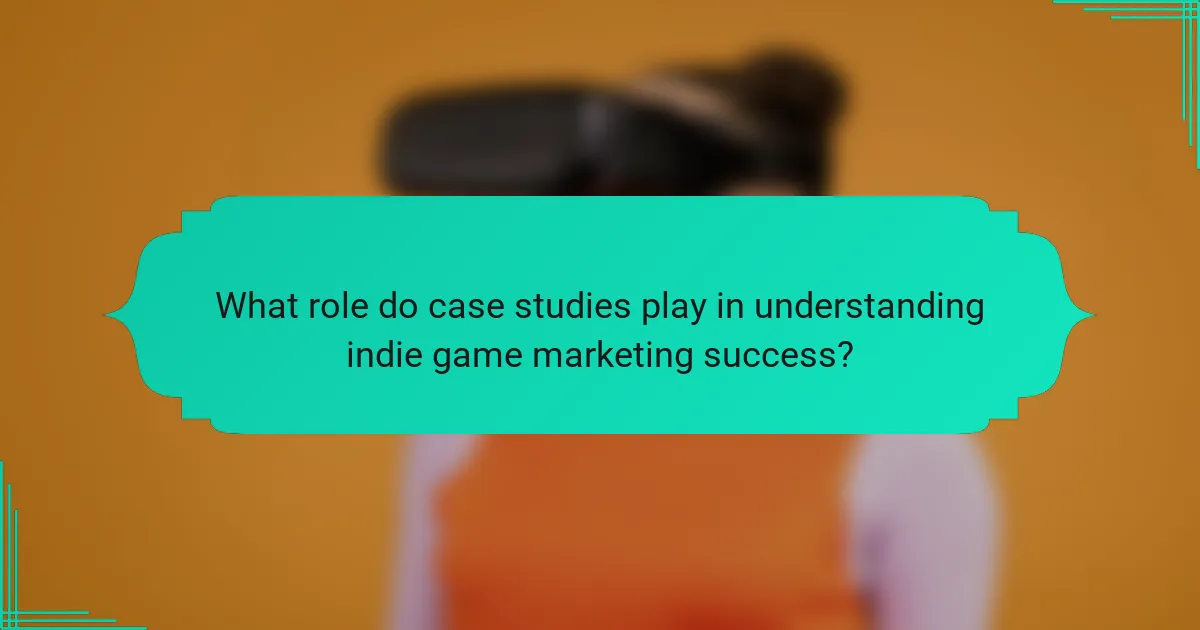
What role do case studies play in understanding indie game marketing success?
Case studies are essential for understanding indie game marketing success as they provide real-world examples of effective strategies. They illustrate how various channels and approaches lead to measurable outcomes, helping developers refine their marketing tactics. By analyzing diverse case studies, indie developers can identify key trends and adapt successful practices to their unique contexts. This empirical evidence enhances decision-making and fosters innovation in marketing strategies.
Which indie games have set benchmarks for effective marketing?
Indie games like “Undertale,” “Hollow Knight,” and “Celeste” have set benchmarks for effective marketing through innovative strategies. These games utilized community engagement, social media campaigns, and unique storytelling to build strong fan bases.
“Undertale” leveraged its narrative and humor, creating viral content that encouraged player sharing. “Hollow Knight” employed a visually appealing art style combined with targeted influencer partnerships to maximize reach. “Celeste” effectively utilized a heartfelt message and a compelling soundtrack, which resonated with players and enhanced its marketing impact.
Overall, these games demonstrate how creativity and community focus can drive successful marketing in the indie game sector.
How can analyzing competitors improve marketing strategies for indie games?
Analyzing competitors can significantly enhance marketing strategies for indie games by identifying effective tactics and market gaps. By studying successful campaigns, indie developers can adopt proven approaches and tailor them to their unique offerings. Competitor analysis reveals audience preferences, pricing strategies, and promotional channels, allowing developers to refine their own marketing efforts. Additionally, understanding competitors’ strengths and weaknesses can inform strategic positioning and differentiation in a crowded market.
What lessons can be learned from failed indie game marketing campaigns?
Failed indie game marketing campaigns highlight several key lessons. Understanding your target audience is crucial; campaigns often fail due to misalignment with player interests. Effective messaging is essential; vague or unclear communication can lead to disengagement. Leveraging social media channels can amplify reach; however, neglecting community engagement can diminish impact. Finally, learning from analytics is vital; failure to analyze performance metrics can prevent improvement in future campaigns.
What best practices should indie game developers adopt for effective marketing?
Indie game developers should adopt targeted marketing strategies to effectively reach their audience. Focus on building a strong online presence through social media, engaging with gaming communities, and utilizing platforms like Steam and itch.io. Collaborate with influencers to gain visibility and create compelling content that showcases the game’s unique features. Leverage email marketing to maintain communication with potential players and provide updates. Attend gaming events and conventions to network and promote the game directly to enthusiasts.
